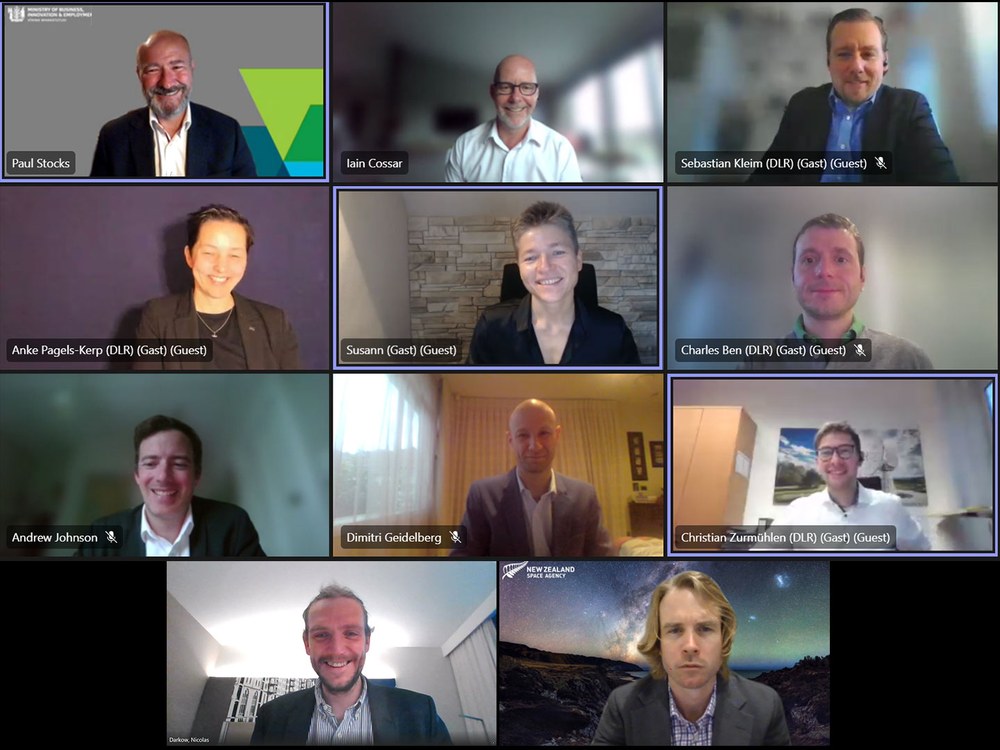New Zealand and Germany cooperate in space research

The New Zealand Space Agency (NZSA) and the German Aerospace Center (Deutsches Zentrum für Luft- und Raumfahrt; DLR) have been cooperating intensively in space research since 2018. Eight joint research projects in the fields of Earth observation, propulsion and radar have now been launched. This was announced during a virtual meeting on 3 February 2022, which was attended by Paul Stocks (Deputy Secretary Labour, Science & Enterprise), Iain Cossar (General Manager, Science & Innovation) and Andrew Johnson (Space Policy & Regulatory Systems) from the NZSA and Anke Pagels-Kerp (Divisional Board Member for Space) and Susann Groß (Head of Space Research and Technology Programme) from DLR.
In the run-up to the event, DLR researchers developed project ideas together with New Zealand institutions in the research and commercial sectors. In three workshops on the topics of propulsion, Earth observation and radar, they developed project ideas and prepared feasibility studies. "This cooperation is an excellent example of how successful international collaboration can thrive and be effectively implemented during a pandemic," explains Anke Pagels-Kerp.
Following the feasibility studies, synergistic projects with great scientific potential were identified through a joint evaluation process. Special focus was placed on ensuring that the partners bring complementary skills to the table and on selecting topics already highly relevant in the respective research institutions. "By implementing these future-oriented projects, DLR and NZSA are deepening their joint commitment to space research and contributing to solving problems together that would have been difficult to complete individually," says Susann Groß.
"There is a long history of scientific collaboration between Aotearoa New Zealand and Germany, and I look forward to our continued joint efforts into these exciting ground-breaking areas of scientific research," read a statement from Hon Dr Megan Woods, New Zealand's Minister for Energy and Resources, and Research, Science and Innovation presented at the meeting.
Paul Stocks is also enthusiastic about the cooperation and its prospects, adding: "Germany is one of Aotearoa New Zealand's leading science and innovation partners and DLR is home to some of the world's most advanced aerospace technology capability. I'm excited about this partnership which sets Aotearoa New Zealand's position in cutting-edge aerospace research."
Project overview
- Implementing a DLR SOFA Unit in New Zealand for Free Space Optical Communications (DLR Institute of Communications and Navigation, DLR Institute for Space Operations and Astronaut Training, University of Auckland)
- Long-term quantum memories in satellite quantum communications networks (DLR Institute of Optical Sensor Systems, DLR Institute of Quantum Technologies, University of Otago)
- An Eye in the Southern Sky - sensor Interfacing for High Altitude Platforms (DLR Microwaves and Radar Institute, DLR Institute of Optical Sensor Systems, Kea Aerospace Limited)
- Takahe - Advanced Object Detectability in a Water Clutter Environment Using InSAR (DLR Institute of Optical Sensor Systems, DLR Microwaves and Radar Institute, Moller Pollard Consulting)
- Thrust measurement of small-scale electric propulsion systems incorporating cryogenic technologies and high magnetic fields (DLR Institute of Aerodynamics and Flow Technology, the Research Trust of Victoria University of Wellington)
- Study of advanced N2O-based green propulsion systems for large satellite and deep space applications (DLR Institute of Space Propulsion, Dawn Aerospace Limited)
- Continuous magnetic heat shield for atmospheric entry using superconductivity ( DLR Institute of Aerodynamics and Flow Technology, the Research Trust of Victoria University of Wellington)
- Carbon-Fibre-Reinforced Polymers (CFRP) for Spacecraft and Launch Vehicles (DLR Institute of Aerodynamics and Flow Technology, University of Auckland)
The collaborative projects started on 01.01.2022. A detailed overview and further background information can be found here.
